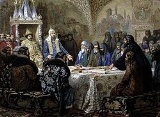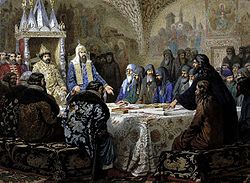
Epifany Slavinetsky
Encyclopedia
Epifany Slavinetsky (? - November 19, 1675, Moscow
) was an ecclesiastical expert of the Russian Orthodox Church
who helped Patriarch Nikon
to revise the ancient service-books, thus precipitating the Great Schism
of the national church.
 In the 1620s, he attended the Kiev Brotherhood School and later furthered his education abroad. Epifany was one of the most educated people of his period that came from Central and Eastern Europe. He came to master the Latin
In the 1620s, he attended the Kiev Brotherhood School and later furthered his education abroad. Epifany was one of the most educated people of his period that came from Central and Eastern Europe. He came to master the Latin
, Polish
, Ancient Greek
and Hebrew
languages. On his return to Kiev
, he took monastic vows in the Kiev Pechersk Lavra
. In the late 1630s, he compiled the first Latin
-Church Slavonic lexicon, which he would revise on several occasions.
Upon hearing about Epifany's learning, Russian Tsar Alexis invited him to correct the ecclesiastical books of Muscovy. Epifany arrived in Moscow
in 1649 and visited the Trinity-Sergius monastery
the same year. He quickly managed to secure the patronage of the boyar Boris Morozov
and Metropolitan Nikon
of Novgorod, who was presently elected Patriarch
.
Epifany joined the Chudov Monastery
in the Moscow Kremlin
, where he was appointed head of the Patriarchal school and charged with administrating the Printing Yard. It was he who revived the mediaeval tradition of delivering sermon
s in Russian churches. In the 1650s and early 1660s, he was busy revising the Muscovite service-books and translating Erasmus and Copernicus from Latin
.
When Nikon fell into disgrace, the scholar supported him and proved that his deposition was contarary to the laws of the church. He spent his last years translating the Septuagint and the New Testament
, as commissioned by his patron Fyodor Rtishchev
. Epifany died in Moscow in 1675.
Moscow
Moscow is the capital, the most populous city, and the most populous federal subject of Russia. The city is a major political, economic, cultural, scientific, religious, financial, educational, and transportation centre of Russia and the continent...
) was an ecclesiastical expert of the Russian Orthodox Church
Russian Orthodox Church
The Russian Orthodox Church or, alternatively, the Moscow Patriarchate The ROC is often said to be the largest of the Eastern Orthodox churches in the world; including all the autocephalous churches under its umbrella, its adherents number over 150 million worldwide—about half of the 300 million...
who helped Patriarch Nikon
Patriarch Nikon
Nikon , born Nikita Minin , was the seventh patriarch of the Russian Orthodox Church...
to revise the ancient service-books, thus precipitating the Great Schism
Raskol
Raskol |schism]]') was the event of splitting of the Russian Orthodox Church into an official church and the Old Believers movement in mid-17th century, triggered by the reforms of Patriarch Nikon in 1653, aiming to establish uniformity between the Greek and Russian church practices.-The Raskol:...
of the national church.

Latin
Latin is an Italic language originally spoken in Latium and Ancient Rome. It, along with most European languages, is a descendant of the ancient Proto-Indo-European language. Although it is considered a dead language, a number of scholars and members of the Christian clergy speak it fluently, and...
, Polish
Polish language
Polish is a language of the Lechitic subgroup of West Slavic languages, used throughout Poland and by Polish minorities in other countries...
, Ancient Greek
Ancient Greek
Ancient Greek is the stage of the Greek language in the periods spanning the times c. 9th–6th centuries BC, , c. 5th–4th centuries BC , and the c. 3rd century BC – 6th century AD of ancient Greece and the ancient world; being predated in the 2nd millennium BC by Mycenaean Greek...
and Hebrew
Hebrew language
Hebrew is a Semitic language of the Afroasiatic language family. Culturally, is it considered by Jews and other religious groups as the language of the Jewish people, though other Jewish languages had originated among diaspora Jews, and the Hebrew language is also used by non-Jewish groups, such...
languages. On his return to Kiev
Kiev
Kiev or Kyiv is the capital and the largest city of Ukraine, located in the north central part of the country on the Dnieper River. The population as of the 2001 census was 2,611,300. However, higher numbers have been cited in the press....
, he took monastic vows in the Kiev Pechersk Lavra
Kiev Pechersk Lavra
Kiev Pechersk Lavra or Kyiv Pechersk Lavra , also known as the Kiev Monastery of the Caves, is a historic Orthodox Christian monastery which gave its name to one of the city districts where it is located in Kiev, the capital of Ukraine....
. In the late 1630s, he compiled the first Latin
Latin
Latin is an Italic language originally spoken in Latium and Ancient Rome. It, along with most European languages, is a descendant of the ancient Proto-Indo-European language. Although it is considered a dead language, a number of scholars and members of the Christian clergy speak it fluently, and...
-Church Slavonic lexicon, which he would revise on several occasions.
Upon hearing about Epifany's learning, Russian Tsar Alexis invited him to correct the ecclesiastical books of Muscovy. Epifany arrived in Moscow
Moscow
Moscow is the capital, the most populous city, and the most populous federal subject of Russia. The city is a major political, economic, cultural, scientific, religious, financial, educational, and transportation centre of Russia and the continent...
in 1649 and visited the Trinity-Sergius monastery
Troitse-Sergiyeva Lavra
The Trinity Lavra of St. Sergius is the most important Russian monastery and the spiritual centre of the Russian Orthodox Church. The monastery is situated in the town of Sergiyev Posad, about 70 km to the north-east from Moscow by the road leading to Yaroslavl, and currently is home to...
the same year. He quickly managed to secure the patronage of the boyar Boris Morozov
Boris Morozov
Boris Ivanovich Morozov was a Muscovite statesman and boyar who led the Russian government during the early reign of Tsar Alexis, whose tutor and brother-in-law he was....
and Metropolitan Nikon
Patriarch Nikon
Nikon , born Nikita Minin , was the seventh patriarch of the Russian Orthodox Church...
of Novgorod, who was presently elected Patriarch
Patriarch
Originally a patriarch was a man who exercised autocratic authority as a pater familias over an extended family. The system of such rule of families by senior males is called patriarchy. This is a Greek word, a compound of πατριά , "lineage, descent", esp...
.
Epifany joined the Chudov Monastery
Chudov Monastery
The Chudov Monastery was founded in the Moscow Kremlin in 1358 by Metropolitan Alexius of Moscow. The monastery was dedicated to the miracle of the Archangel Michael at Chonae...
in the Moscow Kremlin
Moscow Kremlin
The Moscow Kremlin , sometimes referred to as simply The Kremlin, is a historic fortified complex at the heart of Moscow, overlooking the Moskva River , Saint Basil's Cathedral and Red Square and the Alexander Garden...
, where he was appointed head of the Patriarchal school and charged with administrating the Printing Yard. It was he who revived the mediaeval tradition of delivering sermon
Sermon
A sermon is an oration by a prophet or member of the clergy. Sermons address a Biblical, theological, religious, or moral topic, usually expounding on a type of belief, law or behavior within both past and present contexts...
s in Russian churches. In the 1650s and early 1660s, he was busy revising the Muscovite service-books and translating Erasmus and Copernicus from Latin
Latin
Latin is an Italic language originally spoken in Latium and Ancient Rome. It, along with most European languages, is a descendant of the ancient Proto-Indo-European language. Although it is considered a dead language, a number of scholars and members of the Christian clergy speak it fluently, and...
.
When Nikon fell into disgrace, the scholar supported him and proved that his deposition was contarary to the laws of the church. He spent his last years translating the Septuagint and the New Testament
New Testament
The New Testament is the second major division of the Christian biblical canon, the first such division being the much longer Old Testament....
, as commissioned by his patron Fyodor Rtishchev
Fyodor Rtishchev
Feodor Alekseyevich Rtishchev was a boyar and an intimate friend of Alexis I of Russia who was renowned for his piety and alms-deeds....
. Epifany died in Moscow in 1675.

